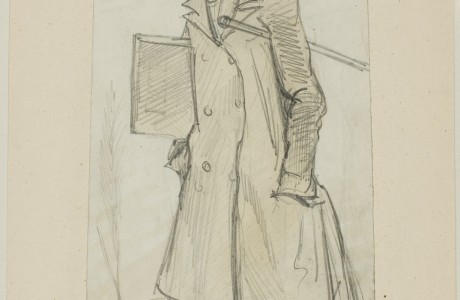Open Access at the Yale Law Library
Select from the items below to learn more about how open access publishing is supported at the Yale Law Library. If you have any questions about open access publishing, you can contact julian.aiken@yale.edu
(All images on these pages are supplied free under open access license from the Art Institute Chicago).
Open Access Guide
Open access is a broad international movement that seeks to grant free and open online access to academic research, information, and publications. A publication is defined 'open access' when there are no financial, legal or technical barriers to accessing it - that is to say when anyone can read, download, copy, distribute, print, search for and search within the information, or use it in education or in any other way within the legal agreements.
Open access is a publishing model for scholarly communication that makes research information available to readers at no cost, as opposed to the traditional subscription model in which readers have access to scholarly information by paying a subscription (usually via libraries).
One of the most important advantages of open access is that it increases the visibility and reuse of your academic research. Researchers report that open-access papers have a greater reach than paywalled ones in two key ways: They attract more total citations, and those citations come from scholars in a wider range of locations, institutions, and fields of research.
A 2014 study of open access publishing in law reviews showed that articles available in open access formats enjoy an advantage in citation by subsequent law review works of 53%. For every two citations an article would otherwise receive, it can expect a third when made freely available on the Internet. Even higher tier journals experience a significant OA advantage (11.4%) due to the attention such prestigious works routinely receive regardless of the format. When focusing on the availability of new scholarship, as compared to creating retrospective collections, the aggregated advantage rises to 60.2%. While the first tier advantage rises to 16.8%.
The Yale Law School's Open YLS Scholarship Repository is a free, open access digital collection of legal scholarship. The repository is designed to make legal scholarship more widely available to the public, and contains works by both current and former Yale Law School faculty, as well as other materials unique to the Yale Law School. The repository is updated regularly, and is open to anyone who wishes to use it. It is intended to be a valuable resource for legal scholars, students, and the general public.
Our repository is indexed by major (academic and non-academic) search engines, and interoperable with other repositories. Because we are open for indexing by any search engine, and interoperable with other repositories, the repository does not wall off content into commercial silos, but openly distributes content using institutional resources. It is designed to expose content to every searcher across the globe, and many more readers will find the repository articles through global, cross-repository searches (for example through Google Scholar) than through local database searches or local browsing.
List of Cambridge University Press Journals in which Yale faculty can publish open access
List 2 of Cambridge University Press Journals in which Yale faculty can publish open access
Directory of Open Access Journals (DOAJ)
Visibility in Open Access Publishing
Open access research outputs receive more diverse citations
The Open Access Advantage for American Law Reviews
Harvard Law School Open Access Policy
Berlin Declaration on Open Access to Knowledge in the Sciences and Humanities
Many of our faculty regularly publish open access scholarship, which are delighted to upload to the Yale Law School's OpenYLS Scholarship Repository.




